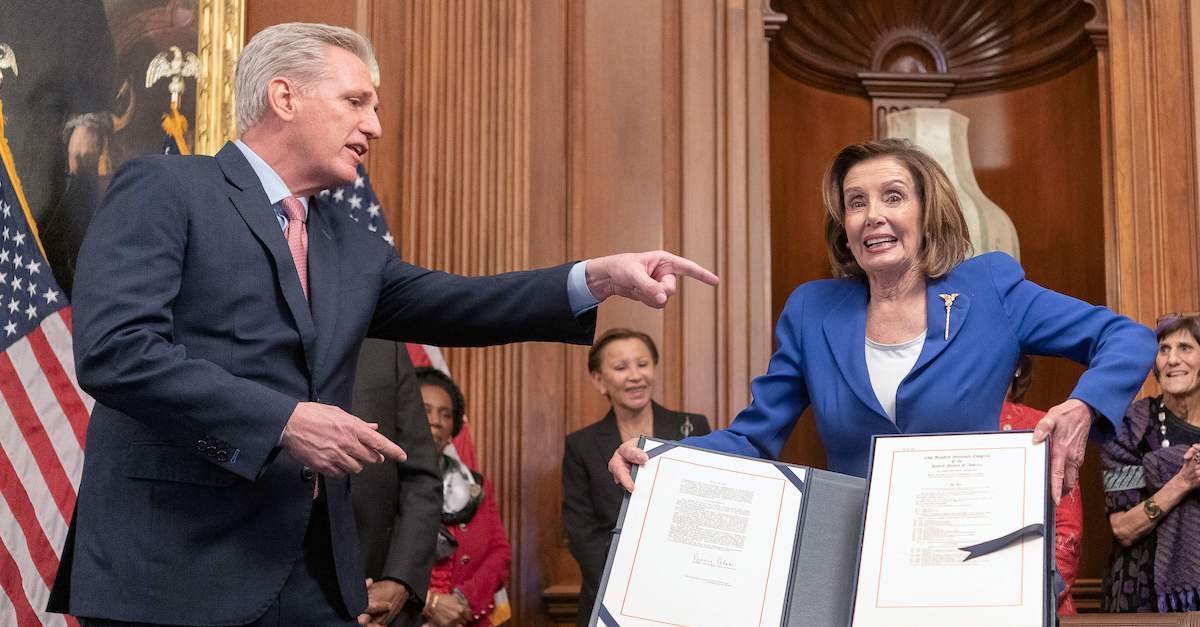
A federal judge has agreed to dismiss a lawsuit filed by House Minority Leader Kevin McCarthy (R-Calif.) against House Speaker Nancy Pelosi (D-Calif.). The litigation challenged a house resolution which allowed elected members to vote by proxy, rather than in person, during the coronavirus pandemic. McCarthy and other plaintiffs unsuccessfully argued the resolution was unconstitutional.
“Because the Court finds that Defendants are immune from suit under the Speech or Debate Clause of the Constitution, it does not reach the merits and grants Defendants’ Motion to Dismiss,” wrote D.C. District Judge Rudolph Contreras, an Obama appointee. That clause “reflects the Founders’ belief in legislative independence,” Contreras said, quoting other cases. The Speech or Debate Clause has broad application: it is a shield against claims involving “all legislative acts,” not just the functions of speech and debate themselves. The proxy vote system was such a legislative act, the judge rationed.
The core authorization clause of the disputed House Resolution 965 reads as follows:
[A]t any time after the Speaker or the Speaker’s designee is notified by the Sergeant-at-Arms, in consultation with the Attending Physician, that a public health emergency due to a novel coronavirus is in effect, the Speaker or the Speaker’s designee, in consultation with the Minority Leader or the Minority Leader’s designee, may designate a period (hereafter in this resolution referred to as a “covered period”) during which a Member who is designated by another Member as a proxy in accordance with section 2 may cast the vote of such other Member or record the presence of such other Member in the House.
Proxies needed to be selected ahead of time via a letter submitted to the clerk of the House. The full text of the resolution further outlines the process; votes made by a proxy were to be recorded as such. Plus, house members could decide to show up in person and vote in person — even if they had previously designated a proxy. In that case, obviously, the house member’s personal vote was the vote that counted.
Contreras recapped the arguments as follows:
Plaintiffs—a group of House Members and constituents—filed suit seeking declaratory judgment that H. Res. 965 is unconstitutional and an injunction against its continued use in the House. Plaintiffs argue the resolution violates the Quorum Requirement, the Yeas and Nays Requirement, the nondelegation doctrine, and the general structure of the United States Constitution, which they maintain require actual physical presence to do the business of the House. Defendants urge the Court not to reach the merits of the case, arguing that various threshold doctrines bar review of Plaintiffs’ claims.
Pelosi and the named defendants argued that the plaintiffs lacked two types of standing. One involved claims of vote dilution.
“The Court accepts that, as a practical reality, when fewer votes are counted each vote carries more weight,” Contreras wrote. “But that does not mean Members’ voting power should necessarily be defined dynamically.”
Though Contreras did not rule on the core of this first standing argument, he did rubbish the claims by the plaintiffs:
The parties do not cite, and the Court has not found, any cases adopting Plaintiffs’ theory of vote dilution. Every case discussed by the parties defines Member voting power relative to the entire congressional body. The Court has doubts whether Members should be entitled to any more than 1/435th share of the voting power in the House.
[ . . . ]
Indeed, one could argue that choosing to abstain or to be entirely absent for a particular vote are methods of expressing that share of congressional power; it is not clear that Members should be subtracted from the denominator when they are not present. However, because the Court relies on other jurisdictional grounds to dismiss this case, it need not resolve whether Plaintiffs’ formulation of the vote dilution injury gives rise to standing.
Contreras similarly discussed, and similarly did not rule upon, another standing question involving an alleged “abstract dilution of institutional legislative power” — which, generally speaking, “cannot establish an injury for the purposes of Article III standing.”
The core of the ruling then turned back to the Speech or Debate Clause. “Applying the Clause here to the administration of rules governing how Members can vote on legislation by proxy does not stretch the meaning” of its language beyond the breaking point, Contreras ruled.
Read the opinion below:
Kevin McCarthy v Nancy Pelosi – Memorandum Opinion by Law&Crime on Scribd
[Photo by ALEX EDELMAN/AFP via Getty Images]